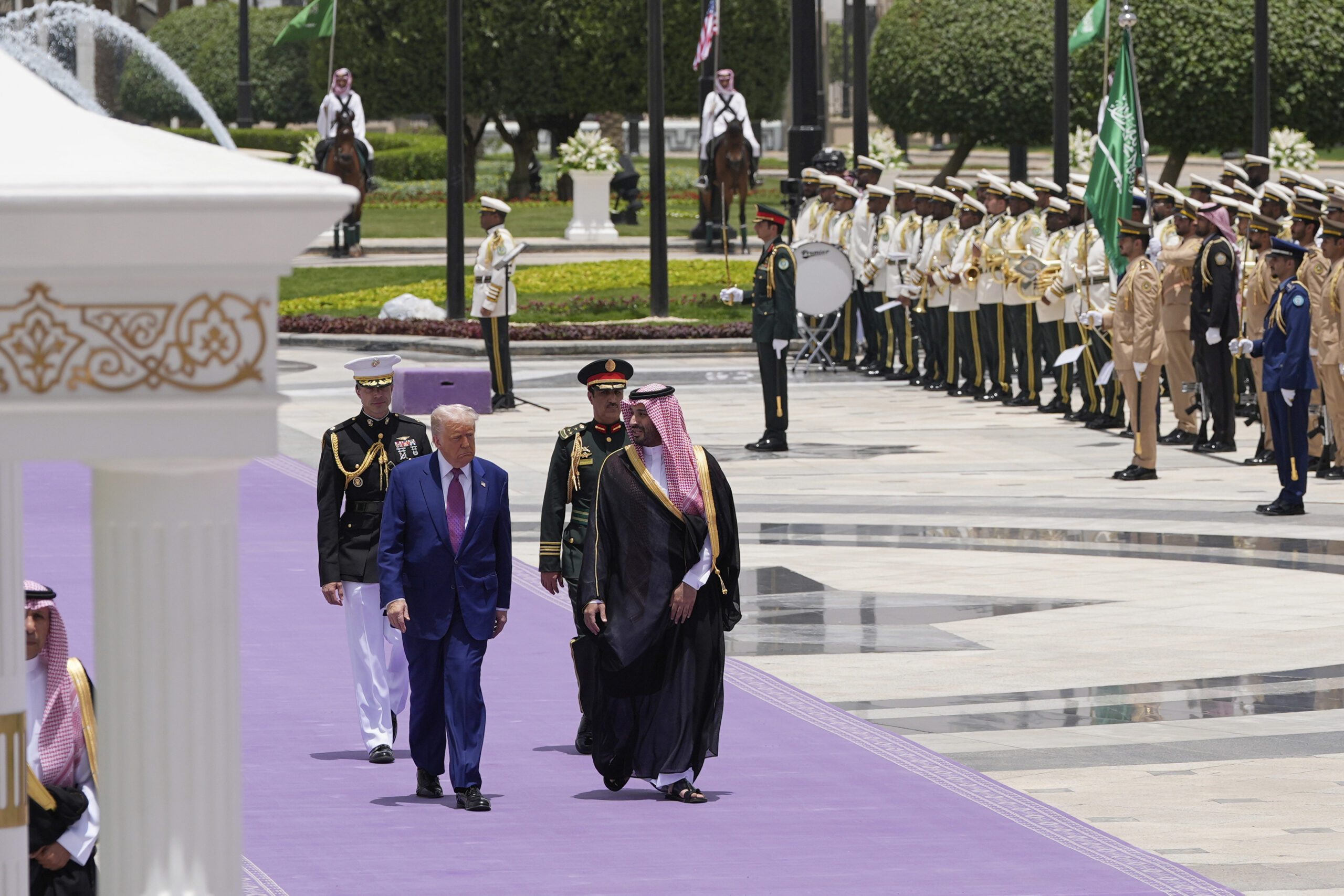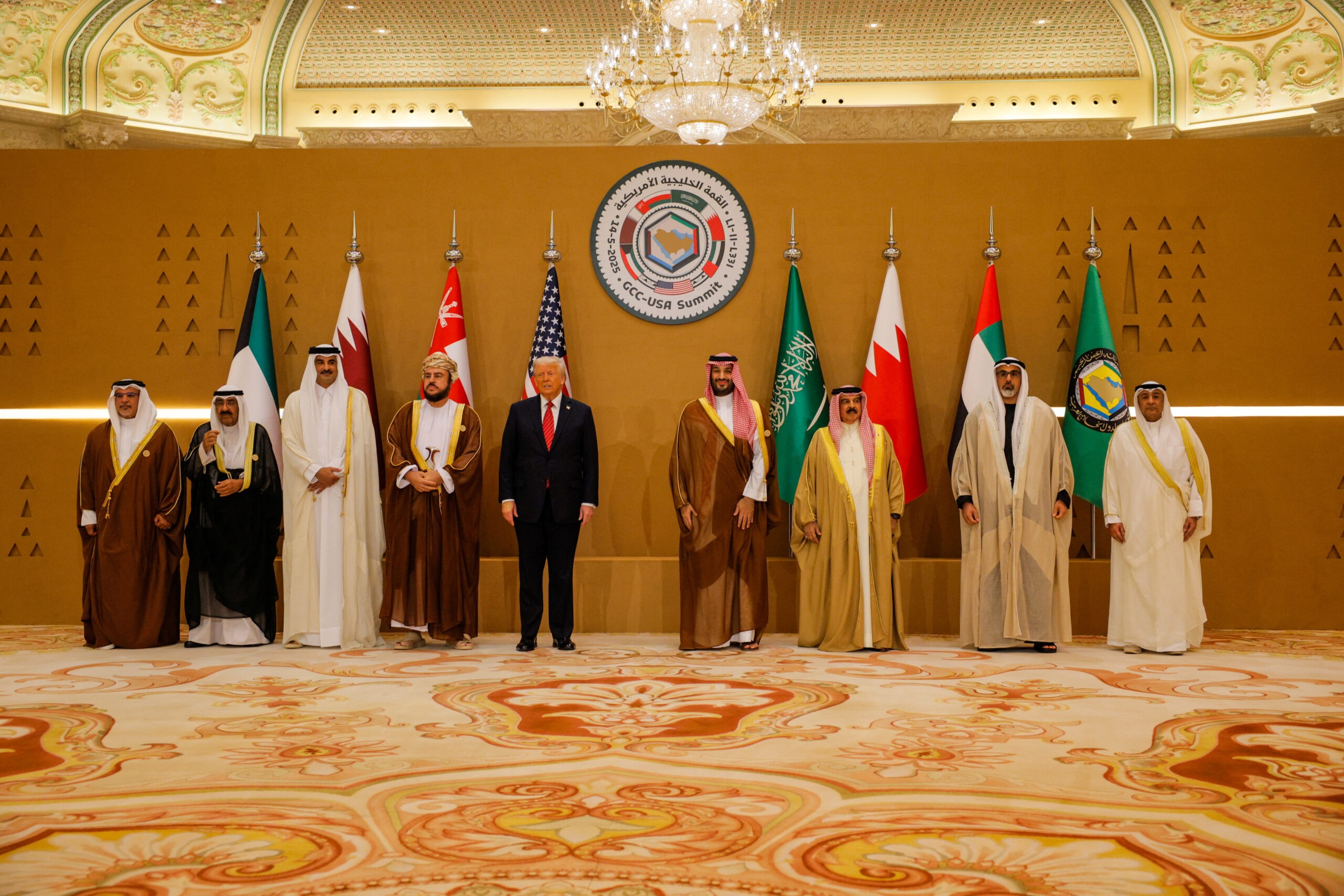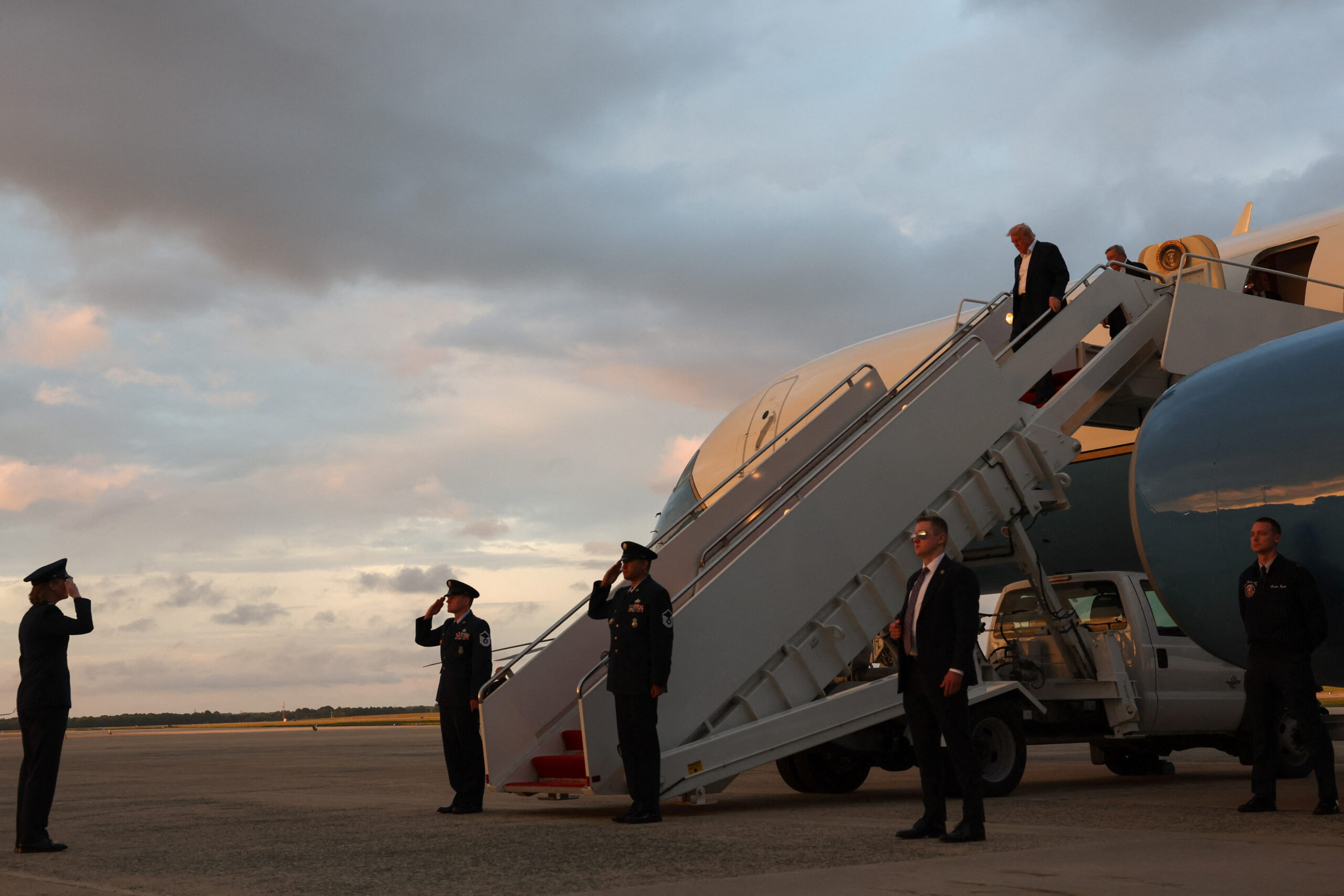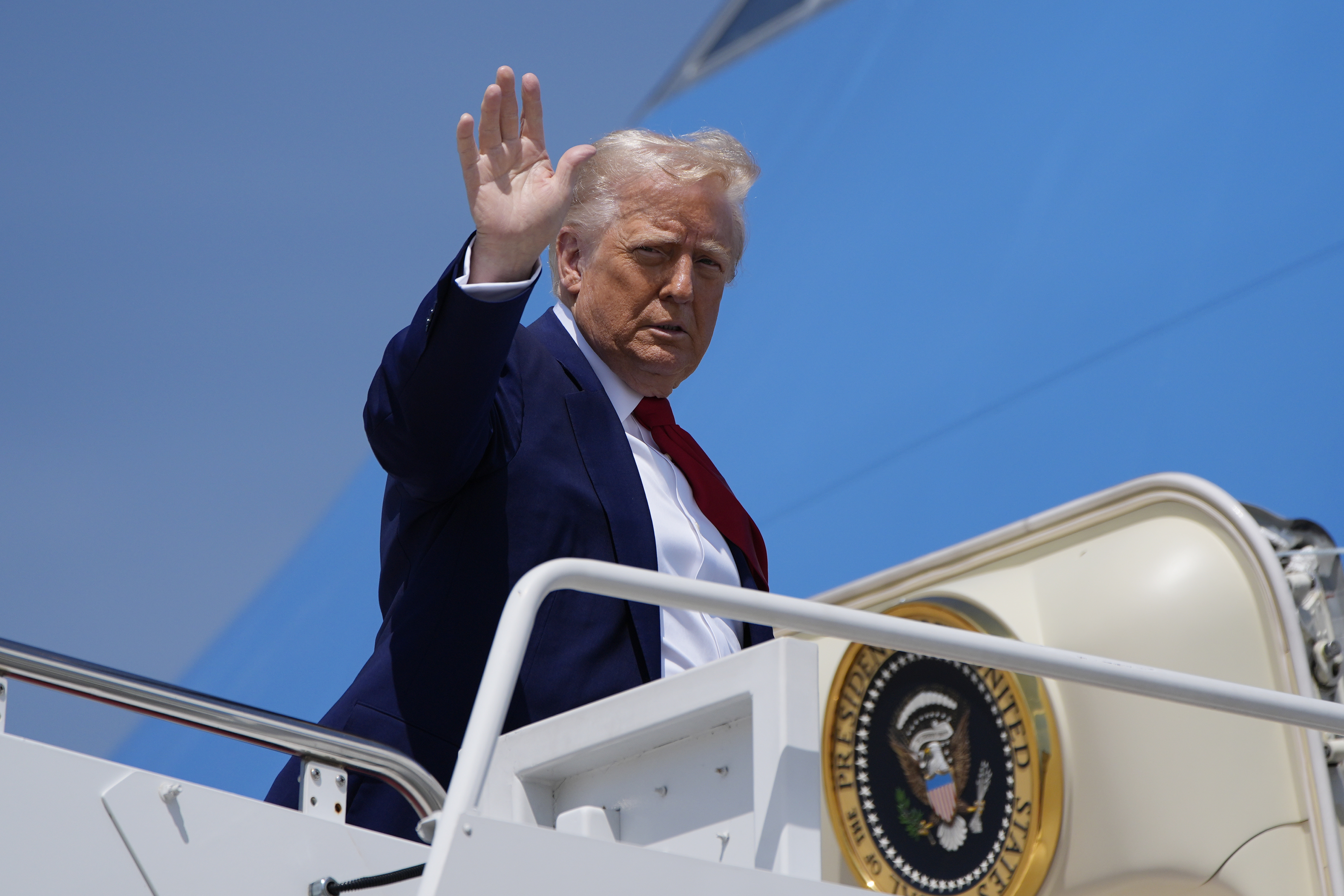It’s Official: Trump and the Gulf Arab Countries Deeply Love Each Other
It was win-win-win-win without any apparent pitfalls in Trump's three-day tour of the Gulf.

In his 2016 presidential campaign, Donald J. Trump famously promised that if he were elected, Americans would get sick of so much “winning”: “We’re gonna win so much, you may even get tired of winning. And you’ll say: ‘Please, please. It’s too much winning. We can’t take it anymore, Mr. President, it’s too much.’ And I’ll say, ‘No it isn’t. We have to keep winning. We have to win more!’” This never accurately described the popular mood in the United States during his first term or since his reelection, but it is quite close to describing the evocative atmospherics, evident affects, and impressive deliverables surrounding his May 13-16 tour of Gulf Arab countries that marked the first major diplomatic sojourn of his second term.
Trump walked away with enormous personal and significant national economic gains. And the three host countries – Saudi Arabia, Qatar, and the United Arab Emirates, visited in that order, benefited in momentous ways as well. The atmosphere of bonhomie was overwhelming, as the U.S. president walked across lavender carpets and was feted at lavish banquets, greeted by military honors, celebrated by performances, and shown the ultimate respect by all his delighted hosts. During the entire trip, Trump seemed remarkably relaxed and affable, able to be himself and sink into a warm bath of reciprocal approbation and mutual understanding.
The most striking and diplomatically significant instances of personal warmth involved his intimate and amiable interactions with the Saudi prime minister, crown prince, and heir apparent, Mohammed bin Salman. The obvious bromance that developed between the two leaders during the visit is a far cry from the “pariah” status that many in Washington had consigned him to, particularly following the 2018 killing of exiled Saudi journalist Jamal Khashoggi at the Saudi Consulate in Istanbul. Former President Joseph R. Biden Jr. used that very word to describe Saudi Arabia on the campaign trail in 2022. And while, as president, Biden eventually did much to rehabilitate Mohammed bin Salman, particularly with a famous fist bump during his July 2022 visit to Jeddah, the Saudi leader has continued to face considerable unpopularity with some factions in Washington, particularly in the Democratic Party. But the U.S. rehabilitation of the Saudi crown prince, with his apparently close friendship with the president, may be virtually complete. After all, Trump’s praise for him was fulsome, telling a Saudi crowd, “He’s your greatest representative, greatest representative. And if I didn’t like him, I’d get out of here so fast. You know that, don’t you? He knows me well. I do – I like him a lot. I like him too much.” The feeling, it was clear, is entirely mutual.
Saudi Arabia got a $142 billion military package, including some of the most sophisticated war fighting capabilities, especially involving missiles, from over a dozen major U.S. defense contractors, the largest weapons sale in history. It also secured $14.2 billion in gas turbine and other “energy solutions” and $4.8 billion in Boeing passenger aircraft. Additionally, Riyadh pledged $100 billion in investment in U.S. artificial intelligence and other advanced technology. Saudi Aramco also secured a $3.4 billion contract to expand the Motiva refinery in Texas and reported deals with 34 U.S. firms totaling $90 billion (though some had already been announced).
The UAE is making AI the centerpiece of its economic and national strategies. Abu Dhabi is close to solidifying a deal to purchase potentially millions of highly advanced semiconductor chips from Nvidia. This technology has been withheld from the UAE and scores of other countries in the past and is available to very few other states. The two countries signed the “US-UAE AI Acceleration Partnership,” which ensures cooperation between the United States and the UAE in an unspoken bid to forestall Chinese dominance in AI. Despite its warm relations with Beijing, the UAE has made clear its determination to keep Washington a centerpiece of its strategic foreign relations. These agreements will considerably strengthen the UAE’s plan to build an AI campus, which is slated to be the largest outside the United States. In addition, Abu Dhabi’s Etihad Airways committed to buying $14.5 billion in Boeing aircraft and parts. Additionally, the UAE committed to $60 billion in new energy investments and $4 billion for an aluminum smelter project in Oklahoma.
Qatar agreed to a $96 billion deal with Boeing and GE Aerospace for commercial jets and parts and to invest $10 billion to upgrade U.S. military facilities in the Gulf country. Gulf Cooperation Council countries together pledged over $100 billion in renewable energy investments.
Overall, Saudi Arabia has pledged $1.3 trillion in overall investments in the United States, the UAE 1.4 trillion, and Qatar 1.2 trillion. Much of this may already have been in the works or be aspirational – or even fictional. But these are the kind of numbers Trump was counting on to come away with much-needed “wins” for the United States under his leadership, particularly after a tough few domestic weeks in which his launched-and-walked-back tariff policies severely rattled markets and cratered his approval ratings.
Trump also came away with victories for his privately held family business, which is operated by his two sons. There are Trump Towers being planned for both Jeddah and Riyadh in Saudi Arabia and Dubai in the UAE, a Trump international golf course and resort in Qatar, and $2 billion in financing for a cryptocurrency venture closely linked to his sons, among other deals. It dramatically demonstrates the unprecedented shelving of traditional restrictions against conflicts of interest characteristic of the Trump era, especially during this second term, involving business dealings linked to the White House. But the appeal of traditional American public ethics standards has never been that strong with many U.S. trading partners, including in the Gulf. Because this is now happening in Washington with no evident pushback, Trump was all the more able to relax and enjoy himself, tallying up win after win in the Gulf countries.
Despite the overwhelming economic emphasis of the trip, diplomacy made a noteworthy appearance when Trump announced the scrapping of decades of crippling sanctions against Syria and met with new Syrian President Ahmed al-Sharaa, formerly known as Abu Mohammed al-Jolani. Until he led the ouster of former dictator Bashar al-Assad, Sharaa was the leader of the Islamist opposition group Hayat Tahrir al-Sham and before that Jabhat al-Nusra, which was once an affiliate of the Islamic State group and before that al-Qaeda. This radical pedigree has fueled significant doubt about the orientation and intentions of his movement in power in Damascus. However, Sharaa’s words and deeds since coming to power in December 2024 – and his history of having engaged in violent struggle against both ISIS and al-Qaeda elements once he broke with them – have helped reassure many that his political evolution is genuine. It is precisely the prospect of unrest, militia extremism, and radical Islamist terrorism threatening the region from a failing and fragmented Syria in the post-Assad era that has led Gulf countries to press Trump, successfully, for lifting sanctions and meeting the new Syrian president. Gulf countries and, they would argue, the United States, maintain significant interests in Syria and need the new regime, which unlike its predecessor is free of Iranian dominance, to succeed and hold the country together while initiating serious reconstruction and economic rehabilitation. They could not support, and invest in, the new Syria systematically as long as the U.S. government was determined to continue to enforce the harsh sanctions that had been aimed at the former dictatorship.
Trump’s lifting of the sanctions against Syria gives the Gulf countries the opportunity to involve themselves in Syria by winning friends and gaining influence through financing reconstruction and other investments in the country. It is, they undoubtedly argued, precisely the kind of “burden sharing” that the United States has been pressing them for for decades. Better yet, by meeting with Sharaa, along with a delighted Mohammed bin Salman, Trump implicitly gave his stamp of approval to everyone who wants to give the new Syrian regime support and the benefit of the doubt. While there was no serious talk about restoring U.S.-Syrian diplomatic relations yet, the meeting went a long way toward reassuring Americans, especially U.S. officials, that Gulf Arab countries are not engaged in anything nefarious when they use their financial and political clout to make a positive impact in the new Syria.
A second diplomatic achievement strongly connected to the visit was the negotiations between the United States and Hamas that led to the freeing of Edan Alexander, the last remaining U.S. hostage held in Gaza. This achievement, once again significantly brokered by Qatar, which has deftly managed a serious potential political exposure in Washington for its close relations with Hamas after October 7, 2023, could have significant repercussions for Israeli policy in Gaza. Israel has said it is preparing a major offensive in Gaza to begin shortly after Trump leaves the region. Israel has announced it is planning to invade with a massive force, herd most of Gaza’s 2.2 million residents into a small holding area in the south of the territory, and scour the rest of Gaza for all remaining human and material assets of Hamas, which it vows to destroy. This nightmarish scenario has produced considerable anxiety throughout the region, which fears the destabilizing impact such a brutal offensive could easily generate. Gulf leaders are undoubtedly hoping that Trump will use his considerable leverage over Israeli Prime Minister Benjamin Netanyahu to restrain Israel and either forestall or attenuate the initiative. The freeing of Alexander by no means ensures Trump will do this, but it considerably increases the prospect that he might. As Trump left the region, the Israeli military already began a bombardment of Gaza, perhaps in preparation for the avowed offensive. But Trump still has the time and ability to intervene with Israel to exercise at least some restraint.
Trump and his hosts carefully prepared the visit to result in a series of uninterrupted, fast and furious wins for all parties. And the visit has resulted in a much stronger partnership between Washington and its Gulf Arab friends than existed before.
The views represented herein are the author's or speaker's own and do not necessarily reflect the views of AGSI, its staff, or its board of directors.




























